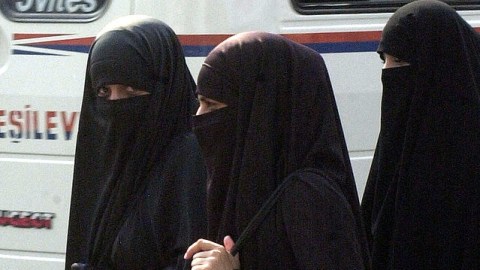The Phony Clash of Civilizations

We really are undergoing a clash of civilizations, Ayaan Hirsi Ali says. Hirsi Ali argues that political scientist Samuel Huntington was right when he wrote in 1993 that future conflicts would be between the West and non-Western “civilizations.” For Huntington, the conflict between civilizations—groups united by common languages, cultures, traditions, and religions—was even more fundamental than the ideological conflict that characterized 20th century politics. In particular, Huntington though that what he called the Islamic and Confucian civilizations would inevitably come into conflict with the Western world.
Huntington’s suggestion that the Islamic world would inevitably clash with the Western world seemed prophetic to many people after the attacks of September 11. Hirsi Ali says that Huntington’s model “reflects the world as it is—not as we wish it to be.” Muslim countries, she points out, are almost without exception illiberal and undemocratic. Even relatively moderate Turkey has taken a recent turn away from the West (although this turn is in part a reaction to the European Union’s reluctance to take a Muslim member). We need, Hirsi Ali suggests, to recognize that with their fundamentally different worldviews West and Islam are and can only be enemies.
Hirsi Ali is right to argue that at stake are competing worldviews. She is right too to be critical of the illiberal elements of Muslim societies. It is not clear, however, that the current conflict is really between civilizations—or even what exactly a “civilization” is. As I have written before, it is wrong to frame the conflict as between Islam as a whole and the West. We should not assume, just because our enemies say they are attacking us in the name of Islam, that all Muslims are actually our enemies. Our real enemy is a particular, fundamentalist strain of Islam, one at odds in many ways with the historical mainstream tradition of Islam. This violent fundamentalism is largely a Middle Eastern phenomenon—most Muslims don’t actually live in the Middle East—and probably owes more to recent history of the region than it does to the tenets of Islam. Blaming Islam for the problems of the Middle East is probably not much different than blaming the dysfunction of African countries on the fact that most Africans are black.
Nor is it clear that what Hirsi Ali identifies as symptoms of the clash of civilizations—the conflict over the proposed Islamic community center near Ground Zero, the ban on building minarets in Switzerland, and the recent ban on wearing burkas in France—are really evidence of some fundamental conflict. It’s hard to see, for example, how an Islamic community center in lower Manhattan—which may never get built in any case—is much of a threat to anyone. None of these things—mosques, minarets, or burkas—are serious public issues. Rather they are ways of diverting public attention away from the real, difficult problems of governing, which would require hard, unpopular choices. But singling Muslims out as the enemy is, unfortunately, generallyverypopular. As Sara Silvestri points out, the burka debate in France serves as a welcome distraction from the need to make budget cuts. Here in the U.S. the Ground Zero controversy provides a handy way to attack liberals before the fall midterm elections. None of this means there’s any fundamental conflict with Islam, only that Muslims make a convenient scapegoats. “Islam,” Silvestri says, “has become an easy card to play.”
Nor can we protect the values of western civilization by failing live up to them. It’s no more justified to ban the wearing of burkas than it would be to ban the wearing of crosses. While many feel the requirement to wear burkas oppresses women, telling women how they can and can’t practice their religion doesn’t make them less oppressed. By the same token, we are no more justified opposing the construction of a mosque near Ground Zero than we would be to oppose the construction of a synagogue in a neighborhood where people didn’t like Jews. The truth is that the real danger to western civilization doesn’t come from outside forces; it is that if we’re not careful we will betray its ideals.




